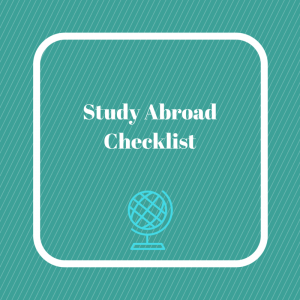 You have made the decision to study abroad. Congratulations! We have outlined an estimated timeline for when you should be completing each step along the way of studying abroad. We started with 9-12 months out, but if you’re under that timeline, try to start those steps as soon as possible! Here’s our study abroad checklist!
You have made the decision to study abroad. Congratulations! We have outlined an estimated timeline for when you should be completing each step along the way of studying abroad. We started with 9-12 months out, but if you’re under that timeline, try to start those steps as soon as possible! Here’s our study abroad checklist!
9-12 Months Before
- First on your study abroad checklist is to start talking! Talk to a variety of people (counselors, friends, family, coworkers, professors) about your plans and see if they have any helpful advice or experience they can share with you.
- Meet with your advisors. Talk with your study abroad advisor about programs that would be a good fit for you and what guidelines you would need to follow. Set a meeting with your academic advisor to take a look at your graduation plan and credits you could take abroad to help you work toward your degree. They will also be able to help find out if the credits you take will transfer to your home institution.
- Find some programs you’re interested in and do some digging into it and the country where it is located. Ask the program’s coordinators if you could speak with alumni.
- Schedule a meeting with your financial aid advisor to discuss costs and available funding.
- Start asking for recommendation letters.
- Apply to the program.
- Apply for scholarships/financial aid/loans.
6-9 Months Before
- Apply for necessary documentation like your Passport (always needed) and Visa (sometimes needed)
- Start learning more about your host country’s culture. Consider reading books and articles to prepare yourself and maybe download a fun language app such as Duolingo.
- Consider how you will travel around when you are there. If you’re going to Europe, look into if Eurorail will be worth your time and money or alternative options.

3-6 Months Before
- Apply for a credit card that has no foreign transaction fees and is widely accepted around the globe (American Express, Visa, Mastercard)
- Research activities you can involve yourself in while abroad. Volunteering at the local hospital, working in a daycare, attending painting classes–whatever your interests are, find something to enrich your experience!
- Start pricing flights and researching about when to book
1-3 Months Before
- Sign up for a travel physical. This will be a comprehensive check of your health and prepare you for living in your host country. Vaccines and immunizations may be required and certain supplements or medications will be explained to you during your visit.
- Book your flight if you have not done so already.
- Start making arrangements for while you are gone. Do you have a pet- what will happen to them? Do you need to find a subleaser? If needed, how will you pay rent while abroad? How will any recurring bills be paid?
- Notify people of your departure- including your boss, extracurriculars, and loved ones.
- Ask your program coordinator about medical insurance.
Weeks Before
- Ask your doctor to get you the necessary amounts of prescriptions you will need while abroad.
- Stock up on contact lenses and consider having a backup pair of eyeglasses.
- Finalize your medical insurance plan if not already done.
- Fill out a change of address form.
- Look into phone plan options while abroad or how you will contact home
- Schedule meeting with your academic and study abroad advisor to make sure all loose ends are tied up and everything is finalized.
- Buy a power adapter.
1 Week Before
- Make copies of all important documents
- Credit Cards
- Passport
- Visa
- Student ID
- Driver’s License
- Notify your bank of the time you will be abroad.
- Exchange your money for local currency- in small notes. Exchange rates at airports are much higher.
- Confirm your flight
- Pack!
Night Before Departure
- Re-confirm your flight, print boarding passes, etc.
- Make sure your carry on is packed and ready to go. You should have a change of clothes, small toiletry bag- no liquids over 3.4 oz, important contacts and addresses, passport, boarding pass/ticket, your wallet with all forms of identification and currency.
Day of Departure
- Arrive at airport with plenty of time before your flight. This is typically 3 hours for international flights.
- Know what you’re doing once you arrive at the airport. Does your program have a scheduled pick up- who are you looking for? If you’re faring on your own, know what cab companies are reputable.
Upon Arrival
- Notify important people back home you arrived safely.
- Attend orientations and arrival meetings your program may have scheduled. This will familiarize yourself with campus and allow you to orient yourself with classmates, teachers, coordinators, etc.
- Be mindful- this includes thought and action. You may experience culture shock and dislike something, but be careful of how you vocalize these thoughts. Additionally, do be mindful that you may stick out and take action to protect yourself from thieves.
That’s the end of our study abroad checklist! Enjoy!
This will be an amazing experience if you let it. Appreciate the difference, don’t let it deter you. After all, why would you spend the time and money to study abroad to have the same experience as your home institution? Try keeping a journal. Writing your thoughts down can help you feel better and journaling your experiences will ensure you’ll remember every detail! Take advantage of the many opportunities you will have so you can return home a cultured, changed person.





